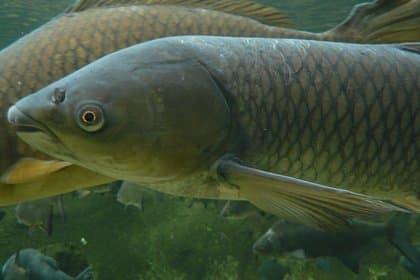Should I Put Grass Carp in My Pond?
Grass carp (Ctenopharyngodon idella) is a species of freshwater fish that is known for its ability to consume large amounts of aquatic vegetation, making it a popular choice for controlling unwanted vegetation in ponds, lakes, and other freshwater bodies. However, before introducing grass carp to your pond, it is important to consider the potential consequences and weigh the pros and cons of doing so. This article will discuss the factors that should be considered when deciding whether or not to put grass carp in your pond, from the benefits of controlling unwanted aquatic vegetation to the negative effects on the aquatic ecosystem and native fish and plant species.

Grass carp (Ctenopharyngodon idella) is a species of freshwater fish that is known for its ability to consume large amounts of aquatic vegetation, making it a popular choice for controlling unwanted vegetation in ponds, lakes, and other freshwater bodies. However, before introducing grass carp to your pond, it is important to consider the potential consequences and weigh the pros and cons of doing so. In this article, we will discuss the factors that should be considered when deciding whether or not to put grass carp in your pond.
The Pros of Putting Grass Carp in Your Pond
Grass carp are known to be effective at controlling unwanted aquatic vegetation in ponds, lakes, and other freshwater bodies. They can consume large amounts of vegetation, reducing the growth of nuisance plants and invasive species. This can improve the overall appearance and health of your pond. Additionally, grass carp can also help to maintain the water quality by reducing the amount of decaying vegetation in the water.
The Cons of Putting Grass Carp in Your Pond
While grass carp can be effective at controlling unwanted aquatic vegetation, they can also have negative effects on the aquatic ecosystem. They can reduce the diversity and abundance of aquatic plants, which can have a cascading effect on the entire ecosystem. This can reduce the habitat and food resources for other aquatic animals, such as insects, fish, and birds. Additionally, grass carp can displace native fish species and disrupt the balance of the ecosystem.
Another important consideration is that grass carp are not native to North America, and their introduction to new areas can cause harm to native fish and plant species, as well as disrupt the balance of the ecosystem. Additionally, their high reproductive potential and their ability to quickly colonize new areas can lead to overpopulation and their negative effects on the ecosystem.
Conclusion
Before introducing grass carp to your pond, it is important to consider the potential consequences and weigh the pros and cons. While grass carp can be effective at controlling unwanted aquatic vegetation, they can also have negative effects on the aquatic ecosystem. It's important to consult with a professional and assess your pond's specific needs and consider alternative methods such as manual removal or chemical treatments. These methods can be more selective and less disruptive to the ecosystem. Additionally, it is important to consider the use of integrated pest management strategies, which involve a combination of different control methods, to minimize the negative effects of grass carp on the environment.
In conclusion, deciding whether or not to put grass carp in your pond is a complex decision that should be based on a thorough assessment of your pond's specific needs and the potential consequences. Consult with a professional, weigh the pros and cons, and consider alternative methods and integrated pest management strategies to minimize the negative effects on the environment. By taking a thoughtful and informed approach, you can make the best decision for your pond and the ecosystem it supports.
No comments yet, be the first to share your thoughts!
Newsletter
Sign up for our newsletter and stay up-to-date on the latest tips, tricks, and techniques in carp fishing. From beginner to expert, our newsletter offers something for every level of angler. Do not miss out on exclusive content, product reviews and fishing reports that will help you catch more carp.
Related Posts
Fishing Luggage Sets: The Must-Have Gear for Every Angler
over 2 years ago
Discover the Beauty and Diversity of Lake Omodeo in Sardinia, Italy
over 2 years ago
The Ultimate Guide to Chest Waders for Carp Fishing: Top 10 Picks
over 2 years ago
10 Fishing Head Torches: Rated from Bad to Great
over 2 years ago
Carp Fishing Rigs: A Comprehensive Guide to Choosing the Right Rig
over 2 years ago
Fish Have Excellent Memories: A Fun Fact for Anglers
over 2 years ago